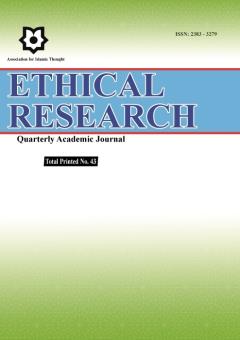Iranian social ethics in the Safavid Era from Chardin's point of view
Subject Areas : Ethics and Islamic EducationSeyed Javad Abedi Shahri 1 , AliAkbar Kajbaf 2 , Morteza Dehghan Nezhad 3 , Mohammad Ali Chelongar 4
1 -
2 -
3 -
4 -
Keywords: Social ethicsm Safavid, Shia, Travelogues, Chardin. ,
Abstract :
The subject of this research is the social ethics of Iranians in the Safavid period from Chardin's point of view. Individual and social ethics are an important part of the public culture of any society. Social ethics, on the other hand, has a profound effect on the personality of any nation throughout history. According to many thinkers of the 220-year period of the Safavid rule, it has left an undeniable impact on the culture of the Iranian people, and with a little reflection, its effects on the lives and moods of the Iranian people can be discerned. The Safavids made significant changes in Iranian culture by formalizing the Shiite religion and trying to spread Shiite teachings. Chardin, a French jeweler, has written his observations and information about Iran and Iranians with great care, which historians believe is one of the main sources of knowledge of the Safavid period. Therefore, examining the historical background of the social ethics of the Iranian people in the current era requires a correct understanding of the process of formation of this issue, especially in the Safavid era. This research seeks to study the social ethics of Iranians in the Safavid period using descriptive-analytical method and based on library resources, especially Chardin's travelogue, in order to provide a better understanding of Iranian society in the current era. The achievement of this research shows that the Safavid rule, in addition to the lives of the people of that time, has so far had an undeniable impact on our social behavior and ethics. The results of this research are applicable to most fields of humanities, especially history and ethics.
قرآن کریم
آقاجری، هاشم،1380، کنش دین و دولت در ایران عصر صفوی، تهران، انتشارات باز
احمدی، حبیب، 1382، روانشناسی اجتماعی، اول، شیراز، دانشگاه شیراز
استگ، لیندا و دیگران 1390، روانشناسی اجتماعی کاربردی، مترجمان مرتضی امیدیان و محمد حسن انوری تفتی، اول، یزد، دانشگاه یزد
اسماعیلی مهرا، حمید و دیگران، 1396، «بررسی اخلاق اجتماعی ایرانیان در سفرنامه های اروپایی-سفرنامه های دورة صفوی و قاجاری» تاریخ فرهنگ و تمدّن اسلامی، شماره 29، س71تا92
اولئاریوس، آدام، 1380، سفرنامة اولئاریوس- ایران عصر صفوی از نگاه یک آلمانی، ترجمه احمد بهپور، اول، تهران، ابتکار نو
-------، ----- ، 1369، سفرنامه (ج 2 بخش ایران) ترجمه حسین کرد بچه، اول، تهران، کتاب برای همه
بارون، رابرت و دیگران، 1388، روانشناسی اجتماعی، ترجمه یوسف کریمی، دوم، تهران، رودان
تاورنیه، ژان باتیست، 1382، سفرنامه تاورنیه، ترجمه حمید ارباب شیرانی ، اول، تهران، نیلوفر
جوادی، محسن،1391، «دیدگاه تشیّع در خصوص اخلاق اجتماعی» اخبار شیعیان، شماره 80، ص3تا7
چیت ساز، محمد جواد، 1388 «درآمدی بر اخلاق اجتماعی ایرانیان، اهمیّت بررسی اخلاق اجتماعی» پژوهشنامه، شماره 48، ص149تا165
حاجیان پور، حمید1386«سفرنامه ها و ادبیات سفرنامه ای اروپائیان عصر صفوی-پیترو دلاواله» تاریخ اسلام در آینه پژوهش، ش 15، ص 31تا52
حسین زاده یزدی، مهدی و مونا طهاری(1398)، «مسئولیّت اخلاقی و اجتماعی در نسبت با جبر اجتماعی» اخلاق در علوم و فنآوری، شماره 1، ص 5تا 11
خلعتبری لیماکی، مصطفی، 1387، جلوه هایی از فرهنگ مردم ایران در سفرنامه ها، اول، تهران، ائلشن
دُرّاز، محمد عبدالله ،1386، دُستور الاخلاق فی القرآن( آیین اخلاق در قرآن)، ترجمه محمدرضا عطایی، اول، مشهد، به نشر
دلاواله، پیترو،1380، سفرنامة پیترو دلاواله، ترجمه محمود بهفروزی، اول، تهران، قطره
راز نهان، محمد حسن، و محمد تقی شیردل، 1396، بازتاب تقدیرگرایی و مؤلفه های آن در سفرنامه های عصر صفوی، تاریخ فرهنگ و تمدّن اسلامی، شماره 29، ص 119تا 143
زکی، حسین 1384، «فلسفة اخلاق» فرهنگ جهاد، شماره 42-41 ، ص 122تا 148
شاردن، ژان 45-1335 ، سیاحتنامه شاردن دائره المعارف تمدّن ایران، ترجمه محمد عباسی ج 6-5-4-1 ، اول، تهران، انتشارات امیرکبیر
----- ، --- ، 74-1372 ، سفرنامة شاردن ، ترجمة اقبال یغمایی ، ج 4-3-2-1 ، اول، تهران، توس
---- ، --- ، 1379 ، سفرنامه شاردن(قسمت اصفهان) ترجمه حسین عریضی، به کوشش مرتضی تیموری، اول، اصفهان، گلها
شرلی، آنتونی، 1357، سفرنامة برادران شرلی، ترجمة آوانس، دوم، تهران، انتشارات منوچهری
شعربافیان،حمیدرضا، 1383، باورهای عامیانه در ایران به گزارش سیّاحان غربی، اول، مشهد، محقق
صالحی امیری، و علی کریمی خوزانی(1395)، «نقش اخلاق اجتماعی بر امنیّت اجتماعی و عمومی» اخلاق در علوم و فنآوری، شماره 1، ص 11 تا18
طالعی اردکانی، محمد 1397 «اخلاق اجتماعی» اسلام پژوهان، شماره 7، ص 82تا107
طباطبایی، سید محمد حسین،1371، المیزان فی تفسیر القرآن، ترجمه سید محمد باقر موسوی همدانی، چهارم، قم، اسماعیلیان
کریمی، علی، 1386، «بازتاب هویت فرهنگی ایرانیان در سفرنامه های عصر صفوی و قاجاری» فصلنامة مطالعات ملی، ش 29، از 31 تا 53
مجیر شیبانی، نظام الدین،1345، تشکیل شاهنشاهی صفویه، اول، تهران، انتشارات دانشگاه تهران
مطهری، مرتضی، 1389، پانزده گفتار: دفاع از سیزده، چهارم، تهران، صدرا
موسوی دالینی، جواد 1395، «تحلیلی برمردم نگاری جامعة ایرانی عصر صفوی به روایت سیّاحان فرنگی؛ بررسی موردی: سفرنامه پیترو دلاواله» پژوهش نامه انجمن ایرانی تاریخ، ش 28، ص 123تا152
هدایتی، محمد 1393 « علم اخلاق: تعریف، موضوع و هدف» پژوهش های اخلاقی، شماره 4، ص 123تا 142.


